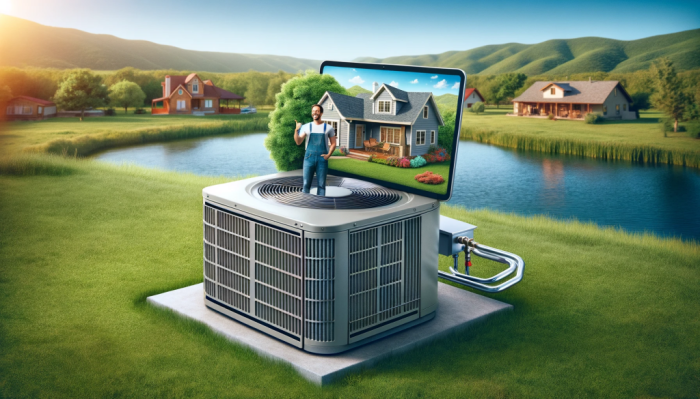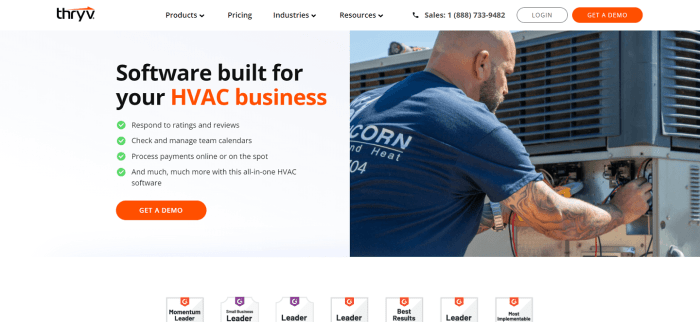Crm software for hvac – The HVAC industry, characterized by its intricate service operations and customer relationships, significantly benefits from the implementation of a robust Customer Relationship Management (CRM) system. A well-chosen HVAC CRM software streamlines operations, improves customer satisfaction, and ultimately boosts profitability. This comprehensive guide delves into the intricacies of CRM software specifically tailored for HVAC businesses, exploring its features, benefits, and considerations for selection and implementation.
Understanding the Needs of HVAC Businesses: Why CRM is Crucial
HVAC businesses face unique challenges. Managing multiple technicians, scheduling appointments, tracking service history, and nurturing customer relationships all demand efficient organization. Traditional methods often fall short, leading to missed appointments, duplicated efforts, and lost revenue. A dedicated HVAC CRM system addresses these challenges by centralizing information, automating processes, and providing valuable insights into business performance.

Source: leadmakermedia.com
Key Challenges Addressed by HVAC CRM Software:, Crm software for hvac
- Scheduling Conflicts and Missed Appointments: Real-time scheduling and dispatch capabilities minimize scheduling conflicts and ensure technicians arrive on time.
- Inefficient Communication: Integrated communication tools facilitate seamless interaction with customers, technicians, and suppliers.
- Difficulty Tracking Service History: Centralized customer records provide a complete history of services, repairs, and maintenance, improving service quality and customer loyalty.
- Lack of Data-Driven Insights: Reporting and analytics features offer valuable insights into business performance, identifying areas for improvement and growth.
- Poor Inventory Management: Integration with inventory management systems optimizes stock levels and reduces downtime.
Essential Features of HVAC CRM Software
Choosing the right HVAC CRM requires careful consideration of essential features. Not all CRMs are created equal, and some offer specialized functionalities specifically designed for the HVAC industry.
Core Features to Look For:
- Appointment Scheduling and Dispatch: Real-time scheduling, automated reminders, and optimized routing for technicians.
- Customer Relationship Management (CRM): Centralized customer database with detailed service history, contact information, and communication logs.
- Technician Management: Tracking technician availability, assigning jobs, and monitoring performance.
- Inventory Management: Tracking parts, supplies, and equipment levels to prevent stockouts.
- Reporting and Analytics: Generating reports on key performance indicators (KPIs) such as revenue, customer satisfaction, and technician efficiency.
- Mobile Accessibility: Access to customer data and scheduling tools from anywhere, anytime.
- Integration Capabilities: Seamless integration with other business systems such as accounting software and payment gateways.
- Marketing Automation: Automated email campaigns for customer retention and lead generation.
- Service Agreements/Maintenance Contracts Management: Tracking contracts, scheduling preventative maintenance, and automating renewal processes.
Benefits of Implementing HVAC CRM Software
The benefits of implementing a dedicated HVAC CRM extend far beyond improved organization. It’s a strategic investment that drives growth and enhances overall business performance.
Key Advantages:
- Increased Efficiency: Automation of tasks reduces administrative overhead and frees up time for more strategic initiatives.
- Improved Customer Satisfaction: Prompt service, personalized communication, and proactive maintenance improve customer loyalty.
- Enhanced Revenue Generation: Optimized scheduling, efficient technician management, and targeted marketing campaigns boost revenue.
- Better Decision-Making: Data-driven insights enable informed decisions regarding resource allocation, pricing strategies, and marketing efforts.
- Reduced Operational Costs: Streamlined processes and reduced administrative overhead lower operating expenses.
- Improved Technician Productivity: Optimized routing and job assignments maximize technician efficiency.
- Stronger Customer Relationships: Personalized communication and proactive service build lasting relationships with customers.
Choosing the Right HVAC CRM Software: Key Considerations
Selecting the right CRM involves evaluating several factors to ensure it aligns with your business needs and budget.
Factors to Consider:
- Scalability: Choose a system that can adapt to your growing business needs.
- Integration Capabilities: Ensure compatibility with existing software and systems.
- User-Friendliness: Opt for a system that is intuitive and easy for your team to use.
- Cost: Consider both initial investment and ongoing maintenance costs.
- Customer Support: Reliable customer support is crucial for addressing technical issues and getting assistance when needed.
- Security: Ensure the system protects sensitive customer and business data.
- Customization Options: The ability to tailor the system to your specific business processes is a significant advantage.
Frequently Asked Questions (FAQs)
Here are some frequently asked questions about HVAC CRM software:
- Q: What is the average cost of HVAC CRM software? A: The cost varies depending on the features, number of users, and provider. Expect a range from a few hundred dollars per month to several thousand.
- Q: How long does it take to implement HVAC CRM software? A: Implementation time varies depending on the complexity of the system and the size of your business. It can range from a few weeks to several months.
- Q: Can I integrate my existing accounting software with an HVAC CRM? A: Many HVAC CRM systems offer integration capabilities with popular accounting software.
- Q: What are the key performance indicators (KPIs) to track with an HVAC CRM? A: Key KPIs include revenue, customer satisfaction, technician efficiency, and average service call time.
- Q: How can I ensure data security with an HVAC CRM? A: Choose a provider with robust security measures, including data encryption and access controls.
Conclusion: Embrace the Future of HVAC Service
Investing in the right HVAC CRM software is a strategic move that can significantly impact your business’s success. By streamlining operations, improving customer relationships, and providing valuable data-driven insights, a well-implemented CRM system positions your HVAC business for sustained growth and profitability. Take the time to research your options, consider your specific needs, and choose a system that empowers your team and enhances your customer experience.

Source: switchonbusiness.com
Resources:
- HubSpot CRM (General CRM with potential integrations)
- Salesforce Service Cloud (Robust CRM with industry solutions)
- (Add links to other relevant and reputable HVAC software providers here)
Call to Action:
Ready to transform your HVAC business with the power of CRM? Contact us today for a free consultation and discover how the right software can optimize your operations and drive your growth!
Query Resolution: Crm Software For Hvac
What are the key features to look for in HVAC-specific CRM software?
Key features include job scheduling, service history tracking, customer communication tools (email, SMS), inventory management, and reporting capabilities specific to HVAC metrics (e.g., equipment types, service calls).
How much does HVAC CRM software typically cost?
Pricing varies widely depending on the features, number of users, and vendor. Expect monthly subscription fees ranging from a few hundred to several thousand dollars.
Can CRM software integrate with my existing accounting software?
Many CRM systems offer integrations with popular accounting software, allowing for seamless data flow between the two platforms. Check for specific integrations before purchasing.
How long does it take to implement a CRM system?
Implementation time depends on the complexity of the system and the size of your business. Expect a timeframe ranging from a few weeks to several months.
